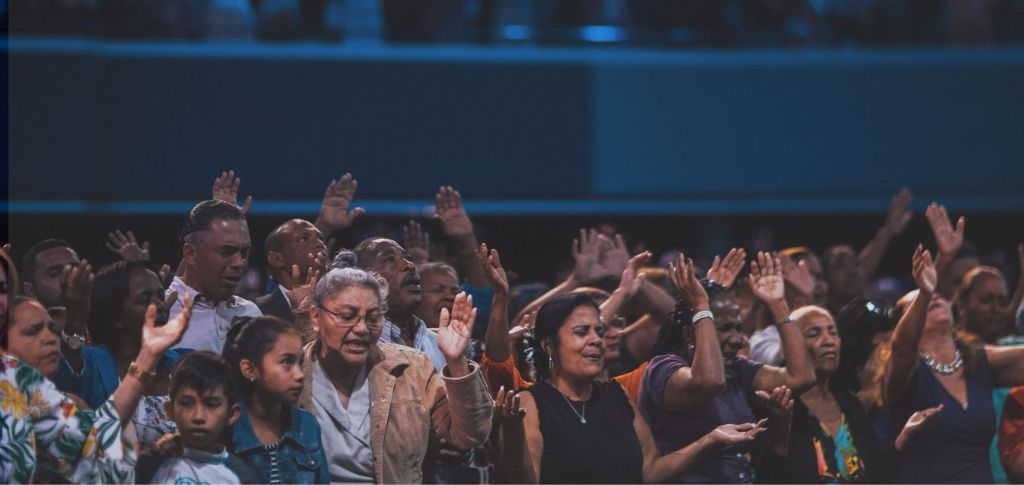Region Overview
Stretching from the northern tip of Latin America up towards North America and Mexico, the Caribbean is an archipelago of over 7,000 islands with over 44 million people speaking four major languages and multiple indigenous dialects. Boasting exquisite natural beauty and popular for its beaches as a holiday destination, the Caribbean faces significant social, financial, and environmental challenges. Meanwhile, the Caribbean church has been in decline, numerically, spiritually, and in missional impact. Caribbean societies are under severe threat from natural disasters, climate change, global pandemics, and the morally vacuous global culture.
Caribbean leaders participated in Lausanne listening calls from September 2020,1 to July 2023 (Lausanne Caribbean Leaders’ Conference in Georgetown, Guyana)2 in preparation for L4 2024, with consensus on the following five key global topics shaping the region to 2050:
- The Gospel and Mission in the Marketplace and the Diaspora
- Spiritual Healing and the Mental Health Challenge
- Caribbean Youth and the Church
- The Environment/Creation Care and the Gospel
- The Caribbean Church and the Disciple-Making Challenge.

The Gospel and Mission in the Marketplace and the Diaspora
Caribbean people are on the move in and across the region and the world. The concept of the Gospel and Mission in the Diaspora and the Marketplace with church members in every sphere of activity, however, is still to be embraced/taught as a legitimate, logical sphere of mission for every church member. Caribbean leaders identified several gaps in accelerating the Great Commission in this regard: including a lack of understanding of integral mission, inadequate, incomplete discipleship, language barriers, intergenerational differences, and socio-economic challenges.
Some reasons cited for the gaps included: a restrictive ‘missionary’ concept, a poorly developed Christian worldview, and inadequate training in skills, understanding, knowledge, mission, and vision to enable God’s people (including children and youth) to be effective witnesses in every sphere. A sharp dichotomy between ‘sacred and secular’ dominates the paradigm of Caribbean evangelical communities.
Two factors support the achievement of the Great Commission: The increasing availability of the Scriptures in specific indigenous languages of our peoples and technology providing virtual, asynchronous access to high-quality training at reasonable costs and great flexibility. Caribbean leaders further affirmed the opportunity and challenge for greater collaboration and resource sharing for researching, customizing, and offering gospel presentations and programs (including sports evangelism) to specific demographics, and bringing together subject/research specialists to produce effective, educational training videos for the various demographics, eliminating competition and duplication of efforts and extending/expanding collaboration with youth and professional Christian fellowships across the region and the world.
Spiritual Healing and the Mental Health Challenge
While Latin American and Caribbean countries consistently report higher levels of happiness than national economic fundamentals would predict, they also exhibit a high prevalence of mental health conditions with depression and anxiety disorders on the rise.3 These mental health conditions, highly prevalent in all countries of the world affecting one in eight people, is a growing crisis needing urgent transformation in the current context where our countries invest the smallest portion of their national budgets in mental health care.4
Untreated mental health challenges lead to suicide, and suicide rates continue to rise, with suicide being the third leading cause of death among 10- to 19-year-olds in the Caribbean Region.
Untreated mental health challenges lead to suicide, and suicide rates continue to rise, with suicide being the third leading cause of death among 10- to 19-year-olds in the Caribbean Region.5 The call for the Caribbean church is for immediate acknowledgement and community collaboration and action as transformational intervention strategists and leaders in discipleship and ministry. In every community we can contribute to a holistic health approach with equal attention being given to mental health as well as the physical and spiritual health of our people across every demographic—children, youth, seniors, and retirees (violence that occurs in the developmental years of early childhood makes children particularly vulnerable).
Specifically, there must be a consistently balanced approach between the spheres of spiritual healing and psychiatric, psychological, and other therapeutic intervention strategies in addressing mental health conditions and challenges. There is also a need for positive social interaction together with the development of social and emotional skills to strengthen resilience.6
Caribbean leaders affirmed the need for destigmatization of people facing mental health challenges in and out the church, implementing more mental health training to design holistic interventions including prioritizing mental well-being in theological education; research in understanding the church’s role in assisting individuals with mental health issues; cultural factors influencing mental health in the Caribbean; effects of parental drug use on children’s mental health and prevention strategies and emotional screening assessments.
Caribbean leaders also affirmed the establishment of holistic regional clinics for mental health, networking with mental health professionals for referrals and support as well as educating the church (starting campaigns against mental health stigma, training mental health coaches, listening to people living with mental health challenges and collaboration with mental health professionals, education systems, families, special-needs homes and support groups).

Caribbean Youth and the Church
More than 11 million youth (15–29), reside across the Caribbean with 60 percent of our population under 30 years old.7 The Caribbean church needs to accept, understand and adapt methods to the major cultural shift among our youth if we are to reach, engage and develop ‘NextGen’ leadership for the Caribbean evangelical church.
With seven distinct generations living side by side in the Caribbean today, it is vital for the three generations of older leaders in active church leadership8 to understand the Gen Z and Millennial generations of youth (high schoolers to young adults) who represent the region and the church’s future, aspirations, and hopes.
With seven distinct generations living side by side in the Caribbean today, it is vital for the three generations of older leaders in active church leadership8 to understand the Gen Z and Millennial generations of youth (high schoolers to young adults) who represent the region and the church’s future, aspirations, and hopes. We must redefine our mission to this demographic and be willing to share true intergenerational leadership with youth (including those raised in the church) who are leaving traditional evangelical congregations, claiming ‘spirituality’ but rejecting traditional forms of organized religion. Efforts to reach and engage them need to be accelerated.
Caribbean leaders posited the need for greater authenticity, genuine fellowship, a redefinition of mission, holistic youth involvement and personal care in reaching, engaging, mentoring, and sharing leadership on the Great Commission with the youth demographic. This relationship-centered approach over mere religious dogma requires consistency between leaders’ words and actions, a shift in the traditional mindset on missions, missionaries, and discipleship at church for their home, school, and marketplace ministry development. This includes active listening and addressing difficult social justice issues of concern to this demographic, who are the subject-matter experts for reaching and discipling their peers.
As subject-matter experts for this demographic and social media content creators/contributors, their knowledge and cynicism about the global church’s participation in colonization, slavery and reparation issues, results in their perception that the church is not addressing these issues and hinders their engagement with the gospel. If this is not addressed, we are at risk of losing a generation, especially where highly respected Caribbean politicians and academics on the regional and global stage have been very vocal but the evangelical church seems to sidestep the issues.
The Environment/Creation Care and the Gospel
The Caribbean faces acute, far-reaching environmental issues including deforestation, flooding, loss of mangroves and coral reefs, rising sea levels and increasingly frequent incidents of category five hurricanes.9 In addition, invasive species, overfishing, new diseases and deleterious effects of climate change add to the immediacy of our environmental challenges. Caribbean youth identified lack of environmental awareness in the education system as a major issue of concern to them.10
The Caribbean church, however, does not consider the environment/creation care as a significant part of our gospel mandate. Despite its impact on every sector—health, the economy, social services, and education, it remains a largely ignored aspect of our Christian stewardship because of: a limited and deficient theological view pertaining to integral mission, barriers and contributing factors include dominion theology, an imbalanced eschatology of Christ’s return, short-sighted and misguided political policies and priorities. Some bridges identified for redressing this included teaching on whole-life stewardship, embracing a kingdom culture mindset, and sound interpretation of Scripture including understanding and honoring God’s priorities about all of his creation.11
Major concern that our mission emphases continue primarily on the souls of people and not sufficiently the created world as mandated in Scripture, leaves the ‘Jamaica Call to Action’, 2012 even more urgent today.12 Other relevant issues include Trinidad and Tobago’s record cancer rates (perhaps linked to the green-house gas emissions from oil production over the past century). Research suggesting that oil production executed near human dwellings correlates with higher-than-normal levels of cancer13 triggers concern for Guyana and Suriname’s significant escalation in oil production. In addition, evidence of highly toxic pesticides and fertilizers in the food chain suggest severe health challenges. The church must therefore educate its people and society about these issues. Further, our communities are affected by inconsistent waste management policies and practices with negative impact on health (governments/technocrats need to be held accountable). There is a need for a paradigm shift in not just thinking but practice in the church as it pertains to creation care and the gospel.

The Caribbean Church and the Disciple-Making Challenge
In general, the Caribbean church does a fairly good job with evangelism but falls short in discipleship, with room to significantly improve our disciple-making among all categories of people and demographics: the whole church bringing the whole gospel to the whole community. The forced separations and technology challenges of the COVID-19 pandemic further restricted discipleship efforts.
The challenges and solutions to the issue of disciple-making in the Caribbean have been identified in the foregoing discussion of our most critical global issues:
- The gospel and mission in the marketplace and the diaspora: Every church member—from children through youth and retirees—must be called, spiritually formed, trained and commissioned as missionaries in their spheres of operation and influence nationally, regionally, and across the world. As we go, sent to make disciples!
- Spiritual healing and the mental health challenge: Acknowledging the reality of mental health challenges, taking a balanced, prayerful approach between the spheres of spiritual healing and psychiatric, psychological and other therapeutic intervention strategies in spiritual formation for discipleship.
- Caribbean youth and the church: Acknowledging and addressing the cultural shift of our youth will require a paradigm shift in our thinking and practice if we are to reach, engage and develop solid, biblical ‘Next Gen’ leadership from youth including our willingness to engage around their social justice issues and concerns, including the church’s legacy of involvement in slavery, colonization, and indentureship.
- The environment/creation care and the gospel: The Caribbean church must embrace the theological imperative of creation care as an integral part of our gospel mandate and Christian stewardship, given its impact on every sector and our disciple-making obligation.
Additional stumbling blocks in disciple-making for the Caribbean church include issues like evolution, the new atheism, human sexuality (including LGBTQ issues and pornography) and race. Sharing the gospel holistically requires connecting with people’s hearts and minds; understanding historical economic and educational social-class gaps and distinctions; minimizing competition and increasing collaboration between para-church organizations and churches.
Between Now and 2050: Regional Considerations
Beyond the above five global issues, Caribbean leaders identify the following three unique, inter-related concerns for the Caribbean church in achieving the Great Commission by 2050:
Political and economic instability
Continuing and rising economic, social, and political volatility in the Caribbean impacts negatively on our disciple-making efforts. The breakdown of law and order across institutions in Haiti, the Guyana-Venezuela border issue, the persecution of Christians in Cuba, and economic stagnation and political repression continue to spur migrants to flee these countries.14 Climate-driven food and water insecurity, slow economic recoveries, and accompanying high levels of crime and violence will likely sustain migratory outflows among believers and non-believers alike.
Crime and violence
The Caribbean has some of the highest violent crime rates in the world and is considered one of the most dangerous regions of the Americas with one-third of the world’s homicide deaths, which is five times higher than North America and ten times higher than Asia.15 Crime and violence (including property crime, money laundering, tax evasion, homicides, drugs, terrorist financing)16 have become growing concerns, with the Caribbean Community (CARICOM) declaring this a public health emergency in 2023.17 Crime and violence affects mental health, productivity and freedom of movement causing rampant migration across the region, affecting Jamaica, the Dominican Republic, Venezuela, and Haiti.
Endemic and pervasive corruption
Caribbean governments and societies have been historically vulnerable to corruption, bribery, and nepotism across every sector, with seventy-four percent of people on average believing politicians frequently use public resources for their own benefit.18 The Caribbean church must acknowledge this reality in spiritual formation and discipleship, preparing every member to live in integrity in the marketplace.

Opportunities and Challenges for the Great Commission
In conclusion, as discussed earlier, Caribbean people are people on the move within the region and around the world, with subject-matter and research expertise across every sphere, access to technology that allows us to develop and provide virtual and asynchronous high-quality training at reasonable cost, and availability of Scriptures in almost all the indigenous languages of the Caribbean. In addition, there are opportunities for further training and scholarships to continue building capacity across every sphere including mental health.
The challenges in achieving the Great Commission for the Caribbean include:
- The need for collaboration so that efforts are not duplicated, competition and silos are minimized, partners are welcomed, and resources are shared.
- A redefinition of missions and missionaries that trains the whole church to understand that the role and mission is whole-life discipleship without any sacred/secular dichotomy, accomplished by every church member (children, youth, and retirees) making disciples wherever they go:
- Widespread mental health challenges, denial and stigmatization, inadequate treatment and insufficient budgetary allocations to address the same.
- Severe threat of climate change and environmental challenges affecting every sector.
- The need for education that meets the needs of Caribbean people, with education that equips them to function in, engage with and leverage the present realities of technology.
We must encourage and theologically equip the church to engage around the biblical responsibility for social justice problems including the mental health, environmental and education challenges above, and the unique interrelated Caribbean challenges of crime and violence, political instability and endemic and pervasive corruption.
Endnotes
- Lausanne Movement, ‘Analysis of Lausanne 4 Listening Calls’, https://lausanne.org/wp-content/uploads/2021/11/The-Evangelical-Church-Interacting-between-the-Global-and-the-Local-Global-Listening-Team-Report-21.11.03.pdf
- Lausanne Movement, ‘God on the Move: Beginning with Guyana’, https://lausanne.org/about/blog/god-on-the-move-beginning-with-guyana
- Yenny Guzman-Ruiz. Think Global Health, ‘A Neglected Challenge of Mental Health’, 2023, https://www.thinkglobalhealth.org/article/neglected-challenge-mental-health
- World Health Organization (WHO), ‘World mental health report: transforming mental health for all’, Geneva, 2022, https://iris.who.int/bitstream/handle/10665/356119/9789240049338-eng.pdf?sequence=1
- WHO. Suicide https://www.who.int/news-room/fact-sheets/detail/suicide
- WHO, ‘World mental health report’.
- Caribbean Youth Dialogues, 2022, https://www.cepal.org/sites/default/files/events/files/2022_caribbean_youth_dialogues_outome_report.pdf
- The Greatest Generation: 1901–1924. The Silent Generation: 1925–1945. War, Great Depression Traditionalists. Baby Boomers: 1946–1964. Post World War 2. Generation X: 1965–1980. Millennials: 1981–1996. Generation Z: 1997–2012. Zoomers or Centennials. Generation Alpha: 2013–2024. Digital Natives.
- David Bookless, Presentation on ‘The Environment/Creation Care and the Gospel’, Lausanne Caribbean Leaders’ Gathering, July 2023, https://www.youtube.com/watch?v=DS2B00lU8OQ&list=PLYGxDL2dvuo5jLB9HNdHQUHAQqVjzxUt8
- Caribbean Youth Dialogues, 2022.
- Bookless, Presentation.
- ‘We are faced with a crisis that is pressing, urgent, and that must be resolved in our generation. Many of the world’s poorest people, ecosystems, and species of flora and fauna are being devastated by violence against the environment in multiple ways, of which global climate change, deforestation, biodiversity loss, water stress, and pollution are but a part. We can no longer afford complacency and endless debate. Love for God, our neighbors. and the wider creation, as well as our passion for justice, compel us to ‘urgent and prophetic ecological responsibility’ (CTC I-7-A).’ Creation Care and the Gospel. Jamaica Call to Action. 2012. https://lausanne.org/statement/creation-care-call-to-action
- Jill E. Johnston, Esther Lim and Hannah Roh. Impact of upstream oil extraction and environmental public health: A review of the evidence. Science of The Total Environment. Volume 657, 20 March 2019. Abstract. https://www.sciencedirect.com/science/article/abs/pii/S0048969718348381
- Global Trends. FIVE-YEAR REGIONAL OUTLOOK Latin America and the Caribbean. 2021. https://www.dni.gov/files/images/globalTrends/GT2040/GT2040-5-YR-Regional-2021317-Latin_America.pdf
- Crime in the Caribbean—stats & facts. 2024. https://www.statista.com/topics/7680/crime-in-the-caribbean/
- Crime in the Caribbean.
- DECLARATION BY HEADS OF GOVERNMENT ON CRIME AND VIOLENCE AS A PUBLIC HEALTH ISSUE. 2023. https://caricom.org/declaration-by-heads-of-government-on-crime-and-violence-as-a-public-health-issue/
- World Justice Project. Corruption in the Caribbean Report. World Justice Project’s ‘Corruption in the Caribbean’ Report Shows Majority Believe Public Officials Corrupt. 2023.